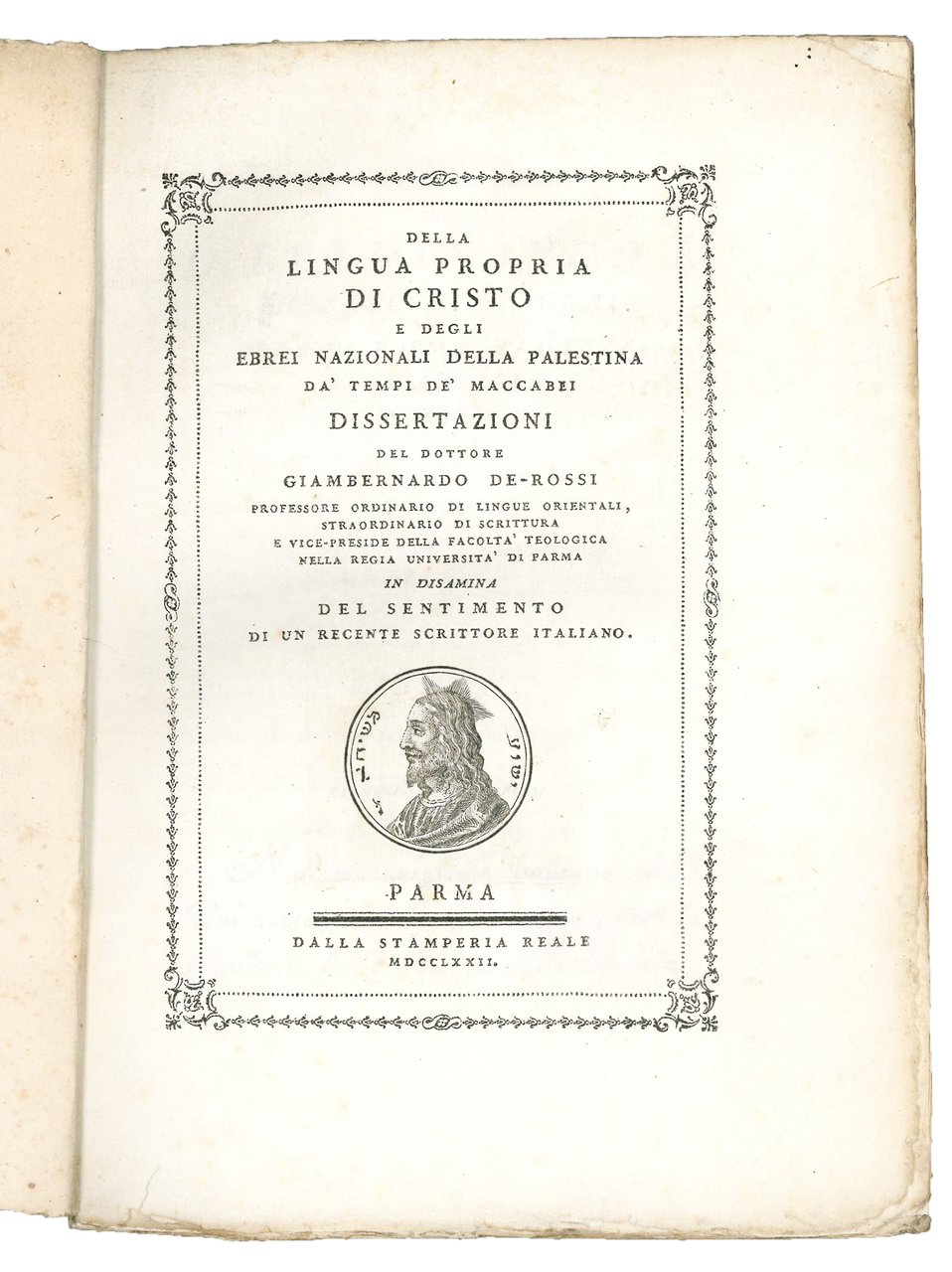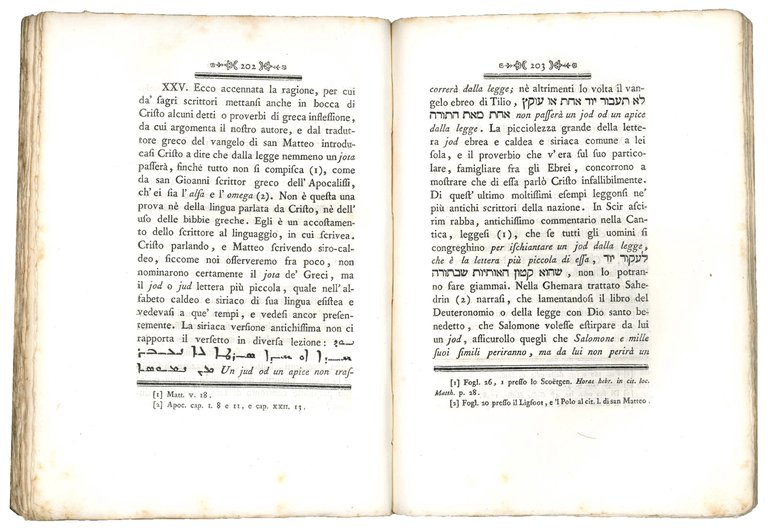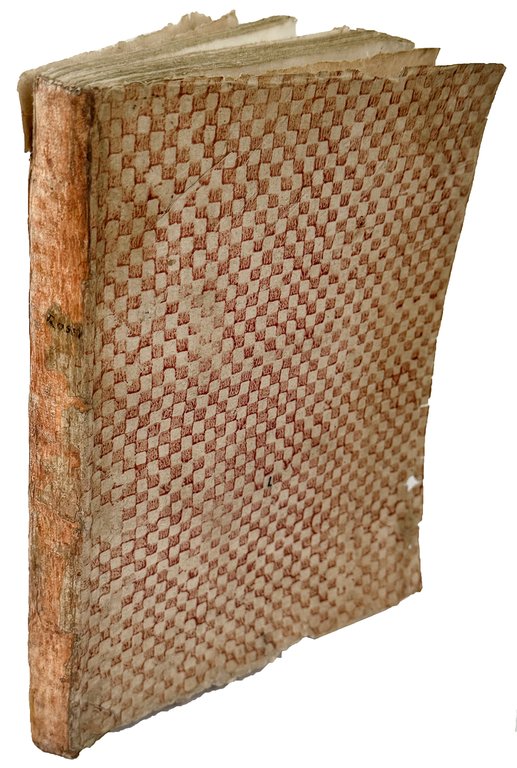Della lingua propria di Cristo e degli Ebrei nazionali della Palestina da' tempi de' Maccabei dissertazioni del dottore Giambernardo De-Rossi [...] in disamina del sentimento di un recente scrittore italiano
Della lingua propria di Cristo e degli Ebrei nazionali della Palestina da' tempi de' Maccabei dissertazioni del dottore Giambernardo De-Rossi [...] in disamina del sentimento di un recente scrittore italiano
Mode de Paiement
- PayPal
- Carte bancaire
- Virement bancaire
- Pubblica amministrazione
- Carta del Docente
Détails
- Année
- 1772
- Lieu d'édition
- Parma
- Auteur
- DE ROSSI, Giovanni Bernardo (1742-1831)
- Éditeurs
- dalla Stamperia Reale (Giambattista Bodoni)
- Thème
- settecento
- Etat de conservation
- En bonne condition
- Langues
- Italien
- Reliure
- Couverture rigide
- Condition
- Ancien
Description
4to (224x166 mm). [8], XVI, 244 pp. Contemporary marbled wrappers (soiled and worn). Title page within a typographic frame with an engraved vignette of Christ in the center. Roman, italic, Hebrew, Arabic and Greek types. Some occasional foxing, a good, uncut copy.
First edition. Soon after his arrive in Parma, De Rossi publicly read three dissertations on the language spoken in Palestine at the time of Jesus against Domenico Diodati's work De Christo graece loquente exercitatio (Naples, 1767), who, contrary to traditional opinion, had argued that this language was Greek. The three dissertations, concerning respectively ‘The Introduction of Hellenism into Palestine', ‘The Use of Hellenism among Palestinian Jews' and ‘The Use of Hellenism in Christ in Particular and in the Apostles', were then printed by Bodoni in 1772 under the title Della lingua propria di Cristo e degli Ebrei nazionali della Palestina (‘On the Language of Christ and the National Jews of Palestine').
De Rossi convincingly demonstrates the use by the Palestinian Jews of the time of an Aramaic dialect which was referred to, in the terminology of the time, as “Syro-Chaldean.” Despite its weaknesses, the work is a significant contribution to the discussion of this central problem of New Testament philology (cf. A. Meyer, Jesu Muttersprache, Freiburg B.-Leipzig 1899, pp. 7-35).
“Sous l'aspect typographique l'ouvrage est fort intéressant car il s'agit du deuxième livre dans lequel Bodoni emploie des caractères hébraïques. À signaler également les citations en caractères grecs, arabes, syriaques et coptes, tous extrêmement bien dessinés, gravés et fondus par Bodoni lui-même” (P. di Rienzo-M. Wittock, Bodoni, quand la simplicité devient art, Brussels, 2000, p. 20, no. 4).
The great Italian Christian Hebraist Giovanni Bernardo De Rossi was born in Castelnuovo in 1742. He studied in Ivrea and Turin. In 1769, he was appointed professor of Oriental languages at the University of Parma, where he spent the rest of his life. His inaugural lecture on the causes of the neglect of Hebrew study was published in 1769 at Turin. De Rossi devoted himself to three chief lines of investigation -typographical, bibliographical, and text-critical. Influenced by the example of Kennicott, he determined on the collection of the variant readings of the Old Testament, and for that purpose collected a large number of manuscripts and old prints. In order to determine their bibliographical position he undertook a critical study of the annals of Hebrew typography, beginning with a special preliminary disquisition in 1776, and dealing with the presses of Ferrara (Parma, 1780), Sabbionetta (Erlangen, 1783), and, later, Cremona (Parma, 1808), as preparatory to his two great works, Annales Hebraeo-Typographici sec. XV. (Parma, 1795) and Annales Hebraeo-Typographici ab 1501 ad 1540 (Parma, 1799). This formed the foundation of his serious study of the early history of Hebrew printing. In connection with this work he drew up a Dizionario storico degli Autori Ebrei e delle loro opere (Parma, 1802; German translation by Hamberger, Leipzig, 1839), in which he summed up in alphabetical order the bibliographical notices contained in Wolf, and, among other things, fixed the year of Rashi's birth; and he also published a catalogue of his own manuscripts (1803) and books (1812). All these studies were in a measure preparatory and subsidiary to his Variae Lectiones Veteris Testamenti (Parma, 1784-88), still the most complete collection of variants of the Hebrew text of the Old Testament. In order to compile it he visited all the chief libraries of Italy, and through its compilation he obtained the knighthood of St. George at the court of Parma and seductive offers from Pavia, Madrid, and Rome. He was also interested in the polemics of Judaism and Christianity, and wrote on this subject his Della vana aspettazione degli Ebrei del loro Re Messia (Parma, 1773), which he defended in a pamphlet two years later; and h



